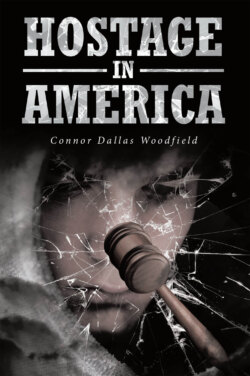Читать книгу Hostage in America - Connor Dallas Woodfield - Страница 6
На сайте Литреса книга снята с продажи.
Оглавление1
Captive in America
one
As an adolescent born in America, “the land of the free,” I was told stories of foreign children being forced into labor, or having to enlist in the military at strikingly young ages. I was stunned when learning of these situations through school and church, and at how remarkably fast these children were launched into adulthood. Growing up in the United States, I was extremely grateful for my freedom, education, and not having to be forced into the military, labor force, etc. I could attend school, play sports and video games, and partake in many other privileges that these freedom-less kids are unable to do. However, the United States is not always a place of joy and opportunity for everyone; as in my case, I was abused, both directly and indirectly, by my father for seventeen years.
There are four major types of abuse: physical, emotional, mental, and sexual. I have suffered from three of the four. I won’t go into the vivid details of the abuse I was subjected to as I have relived it in overabundance. My biological father, who I will identify as my birth father in this text, was anything but what a father should be. A father is commonly defined as “a man who gives care and protection to someone or something” (Merriam-Webster). Mine was the exact opposite; he was a monster: “a person who excites horror by wickedness, cruelty, etc.” (Dictionary.com).
Throughout this legal battle, I was sent to talk to numerous counselors, lawyers, and many other professionals. I first told my story to a counselor I was referred to named Dr. X. He was tall, had facial hair, a strong southern drawl, and was the epitome of an authentic Texan.
Initially, he appeared to be extremely intimidating, but after visiting him several more times, I started to feel comfortable talking to him. Eventually, talking with him in his office soon became a safe haven for me, where I could speak my mind about anything, judgment-free, and still do monthly almost five years later.
To this day, he has been the only man I have ever trusted in my life. I often think how lucky his kids are to have a father like him and ponder what life would have been like if he was my dad. Not only is he a kind, genuine human being, but is also a talented musician, pilot, motorcycle rider, marksman, and sailor. He’s so kind that he even bought all his grandchildren a Subaru Outback for Christmas one year. What a great dad he would have been, but a dad like that wasn’t in the cards for me.
My brother and I were assigned a court-appointed amicus attorney to “represent” us. This representation, however, was nonexistent, at least on our party’s side. At our meeting, this guy was over an hour late, looked tired, unkempt, had long greasy hair, and only met with us once. After speaking to him for only one-minute duration (approximately fifteen to thirty minutes), he treated me as if I was perfidious and told me he didn’t believe me.
Next, I was sent to an advocacy center for a special type of interview. My counselor mentioned that they may or may not film us, and that a police officer would be there, while my mom informed us that she was not supposed to talk about it, leaving my brother and me to enter extemporaneously. Needless to say, my younger brother and I were extremely nervous, and thus hindered throughout our interviews. Looking back now as a seventeen-year-old, I acknowledge that my brother and I didn’t get everything across to our interviewers that was vital to our case. Not only were their questions odd, difficult, and manipulative, they also were extremely leading.
Subsequently, we were sent to interview with a police officer and our local district attorney. This interview was located at our county’s massive four-story courthouse, in small white room. It took place during a hot summer afternoon, for only a small span of time. Those who questioned us appeared to not care—asking broad, informal questions without any emotional feedback whatsoever. It seems this attitude of apathy and lack of due diligence among legal professionals, is starting to form a trend.
Retracing all the unspeakable actions done to me in seemingly pointless examinations is beyond agonizing. After going through this grueling process, one would expect at least some positive resolutions for my brother and me, but no, the court and legal system in place did not care what happened to us, let alone acknowledge our voice. In modernity, I intermittently share pieces of my story with people, but the nightmares and damage he caused follow me like a shadow. Though these brutal battles I have persevered through have made me a stronger person, they also have made me realize that I am a hostage in America, with no voice or power to protect myself.
